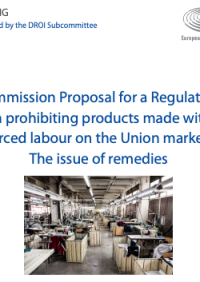
The European Union (EU) is committed to the elimination of forced labour, a denial of rights of which there are 28 million victims globally. In September 2022, the European Commission proposed a Regulation to ban all products made by forced labour from the EU market (COM (2022) 453). This proposal has been criticised for failing to facilitate remedies for forced labour victims, in line with EU and global standards such as the United Nations Guiding Principles on Business and Human Rights.
This Briefing has been co-written by Amy WEATHERBURN (FNRS Postdoctoral Fellow, ULB) and Claire METHVEN O’BRIEN (University of Dundee and Danish Institute for Human Rights) and coordinated by TEPSA.
This Briefing examines the case for including measures to promote access to effective remediation for victims of forced labour located outside the EU into the Commission’s proposed Regulation. First, it outlines the legal framework for EU action to promote remediation for victims of forced labour located outside EU territory, as well as obstacles to accessibility and effectiveness of remediation for victims in the forced labour context. Second, it considers a range of measures to promote remediation for victims of forced labour that could be incorporated in the Regulation and their feasibility. In conclusion, the Briefing highlights changes to the Commission’s proposed Regulation to advance remediation for victims that are feasible and would increase its alignment with international and EU legal and policy commitments.


